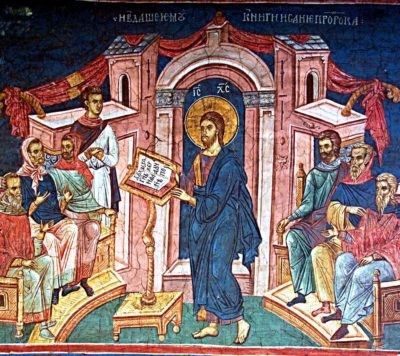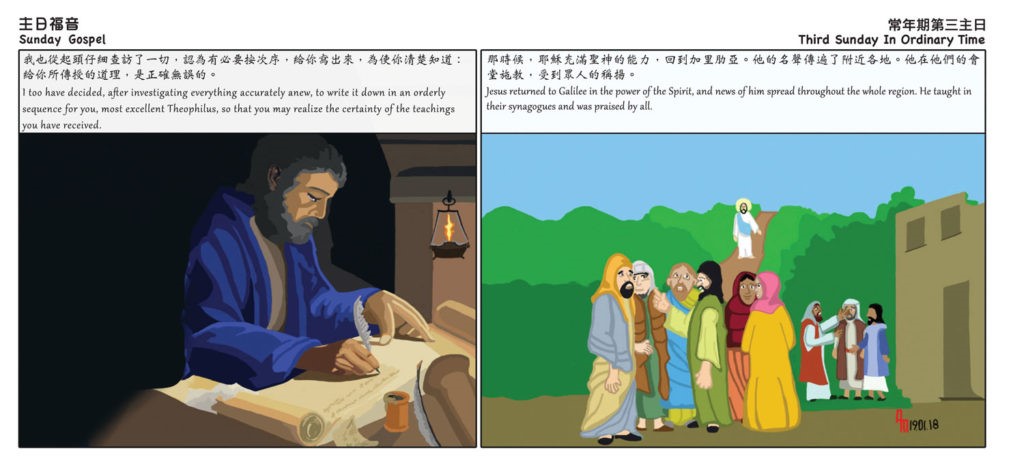Neh 8:2-10; 1 Cor 12:12-30; Lk 1:1-4, 4:14-21
– Fernando Armellini SCJ
Claretian Publications, Macau
It was a Saturday. Like every pious Jew, Jesus goes to the synagogue.
There are two readings and the one who reads the second text usually does the homily. The homily is pretty easy: it is enough to memorize the explanations and comments made by the great rabbis and refer their opinions.
Jesus is invited for the second reading and the homily. He found the text from Isaiah: “The Spirit of the Lord is upon me. He has anointed me to bring good news to the poor, to proclaim liberty to captives and new sight to the blind; to free the oppressed and to announce the Lord’s year of mercy.” Then, he rolls up the scroll, delivers it to the attendant and sits; all eyes are fixed on him. The rabbis explained the Word of God while sitting. Assuming this position Jesus is emphasizing that he has become the teacher.
Who is the man charged with bringing good news to the poor? Who is Isaiah talking about? The prophet refers to a character who, about 400 years before Christ, was sent by God to comfort the children of Israel who returned from exile in Babylon. They lived in the dramatic situation of the rich exploiting the poor, the owners did not pay their workers, the strong dominated the weak (cf. Is 56:10–57:2).
In this historical context, a man invested by the Spirit of the Lord is sent to proclaim the “year of grace,” “jubilee,” the time when all debts are forgiven, ends all forms of slavery end and justice is re-established.
Today—Jesus begins to proclaim—“these prophetic words come true”. He does not comment on the text of the prophet but proclaims its fulfillment. Today begins the year of grace, the endless feast for everyone because to everyone, in God’s name, salvation, free and without conditions is announced.
Today the word of Jesus begins to free not only from diseases—which are a sign of a decrease in life—but from all the psychological and moral barriers that prevent growth and inhibit the inspirations of love. The tangle of uncontrolled passions that cause people to fall back on themselves in the pursuit of self-interest, the thirst for possessions, the frenzy of power and success are chains. These evils, today, begin to be crushed. The irresistible force that breaks them is that of the Holy Spirit (v. 14) who is at work in Jesus not only when he performs miraculous healings, but also when, with his powerful word, he breaks the bonds that envelop and keep people in the state of slavery (Lk 4:3).
Translated by Fr John Ledesma SDB
Abridged by Fr Jijo Kandamkulathy CMF
Whom are you looking at?
– Rev José Mario O Mandía
The Gospel tells us that after Jesus read the Scripture, “the eyes of all in the synagogue looked intently at him” (Lk 4:20).
One of the reasons Jesus Christ took on our humanity is to become a visible example which we can imitate. God wants us to be his children, but how does one live or behave as a son? The answer can be found in Jesus, the Beloved. God our Father wants us to listen to him (Mk 9:7; Lk 9:35) so he can instruct us.
Aside from listening, we also need to look intently at him. Looking intently requires time and requires effort. It calls for putting aside distractions.
We need to look at him intently in the Gospel. How can we do this? By reading God’s Word with a prayerful attitude. Before we listen or read the words of Scripture, we need to ask the Holy Spirit to open our ears, to cleanse our vision, give light to our understanding and set us on fire: “Come, Holy Spirit, enkindle in us the fire of your love.”
We then need to tell Jesus, “Lord Jesus Christ, my Lord and Savior, Beloved Son of the Father, I know that you have something to tell me today. I believe that each day you have a new message for me. I want to be attentive to your voice, and to look at you intently.”
We also need to look at him intently in the Eucharist. We need to spend time with Him in thanksgiving after we receive Him in Holy Communion. And at another time of the day, we need to go back before Him to contemplate Him in His humble and loving presence.
The result of looking intently on Jesus is that it transforms us. Contact with Jesus is so life-changing that we ourselves become witnesses to his teachings and his life. St Paul says, “It is no longer I who live, but Christ who lives in me” (Gal 2:20). I no longer make my own decisions, I let Him lead me where He wills.
The change that Jesus Christ effects in our life makes us witnesses and thus, effective teachers. St Paul VI taught, “Modern man listens more willingly to witnesses than to teachers, and if he does listen to teachers, it is because they are witnesses” (Address to the Members of the Consilium de Laicis, 2 October 1974; Evangelii Gaudium 41)
So much depends on how intently we look at Christ. But whom is it that we are look at right now?



 Follow
Follow


